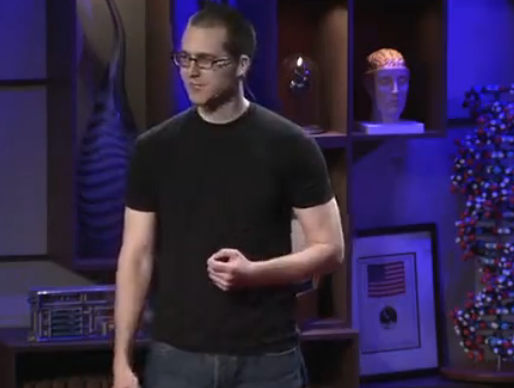So, the moral being: don't piss off crows.
所以--大家看到了吧,千萬別惹烏鴉。
So now, students at the University of Washington that are studying these crows, do so with a giant wig and a big mask.
正是這樣的緣故,現在華盛頓大學做烏鴉研究的學生都帶上巨大的假發,還套上面具。
It's fairly interesting.
這真是令人啞然的一件事。
So we know these crows are really smart, but the more I dug into this,
以上說的無非是要證明烏鴉是非常聰明的,但我研究得越是深入,
the more I found that they actually have an even more significant adaptation.
越是覺得它們的智慧要比我們想象的高出一個層次。
Crows have become highly skilled at making a living in these new urban environments.
在新的城市環境中,烏鴉們的謀生技能正在變得越來越嫻熟。
In this Japanese city, they have devised a way of eating a food that normally they can't manage: drop it among the traffic.
這是一座日本城市,這里的烏鴉發明了一種吃果仁的辦法--把堅果丟到車道上。
The problem now is collecting the bits, without getting run over.
然后飛走,等待汽車開過。

Wait for the light to stop the traffic. Then, collect your cracked nut in safety.
之后它們在馬路邊等待綠燈,然后飛到馬路中央安全地銜走那顆果仁。
Yeah, pretty interesting. What's significant about this isn't that crows are using cars to crack nuts.
看看,這是不是挺有趣的?不過,有趣的倒不是借助過往車輛壓開果核的做法。
In fact, that's old hat for crows.
事實上,烏鴉老早就學會了這門手藝了。
This happened about 10 years ago in a place called Sendai City, at a driving school in the suburbs of Tokyo.
剛才大家看到的景象發生在10年前東京市郊的一家駕駛學校附近。
And since that time, all the crows in the neighborhood are picking up this behavior.
從那時開始,附近的烏鴉也學會了這樣的吃堅果的方式。
Now every crow within five kilometers is standing by a sidewalk, waiting to collect its lunch.
如今,方圓五公里內的烏鴉都在人行道旁守候著,等待過往車輛為他們帶來午餐。











